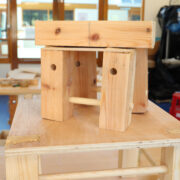Exam Board
OCR Entry Level Science at KS3
Specification Number
Entry Level Science: R483
What will be studied
Entry Level Science Content: There are 36 teaching items in total, 12 for each of biology, chemistry and physics. In all three sciences, students develop their understanding of how scientific principles and concepts help describe complex and diverse natural phenomena in terms of a small number of key ideas. They also develop relevant practical skills.
Biology
- ELB1: Dead or alive (cells) – the role of cells
- ELB2: Babies (reproduction) – human reproduction
- ELB3: Control systems – control systems of the human body
- ELB4: Fooling your senses – sight, smell, taste, touch and reflex reactions
- ELB5: Gasping for breath – human respiration and respiratory diseases
- ELB6: Casualty – human circulatory system
- ELB7: You can only have one life (look after it) – digestive system and drugs
- ELB8: Body wars – human immune system
- ELB9: Creepy crawlies – ecosystems and fieldwork
- ELB10 Extinction – fossils, evolution and biodiversity
- ELB11: My genes – DNA and genetics
- ELB12: Food factory – plants and food production
Chemistry
- ELC1: Physical or chemical change – using the particle model
- ELC2: Acids and alkalis – acidity and alkalinity in everyday science
- ELC3: Everything in its place – the periodic table
- ELC4: Clean air and water – environmental chemistry
- ELC5: Novel materials – alloys, composites and carbon compounds
- ELC6: Sorting out – purifying mixtures
- ELC7: Let’s get together – salts (NaCl), reactions and electrolysis
- ELC8: Heavy metal – reactivity and the extraction and recycling of metals
- ELC9: Fuels – hydrocarbons and polymers
- ELC10: Are you overreacting – using periodic table to predict rates of reaction
- ELC11: How fast? How slow? – practical laboratory skills and rates of reaction
- ELC12: CSI plus – forensic science
Physics
- ELP1: Getting the message – using waves to communicate
- ELP2: Full spectrum – electromagnetic waves
- ELP3: Medical rays – using waves in medicine
- ELP4: Hot stuff – heat, temperature and states of matter
- ELP5: Alternative energy – renewable and non-renewable energy sources
- ELP6: Nuclear power – atomic model and radioactivity
- ELP7: Our electricity supply – domestic electricity supply and Ohm’s law
- ELP8: Attractive forces – magnetic fields and electromagnetism
- ELP9: Pushes and pulls – forces and Newton’s laws of motion
- ELP10: Driving along – motion, forces and energy transfer
- ELP11: Fly me to the moon – rockets and the solar system
- ELP12: Final frontier – astronomy and astrophysics
Learning Methods
Science practicals related to the content, research, discussion, debates, creating notes, use of exam questions.
Expectations of Students
Students are expected to attempt all tasks given and to work to the best of their abilities at all times; staff will support students on a personalised level to allow this. Students will be expected to follow all health and safety instructions while completing practical work.
How is the course assessed
KS3 – Entry Level Test papers at the end of each topic.
What websites are recommended
- BBC Bitesize
- GCSE Biology:www.aqa.org.uk/subjects/science/gcse/biology-8461
- Entry Level Science: www.ocr.org.uk/qualifications/entry-level/science-r483-from-2016/
What equipment is needed
All equipment will be provided for lessons, students will need to have a hair band to tie up long hair.
Career Paths/Next Steps
Entry Level Science – Science is involved with all courses and career paths after school in some way. It also prepares students for taking the Exams in Year 11.






